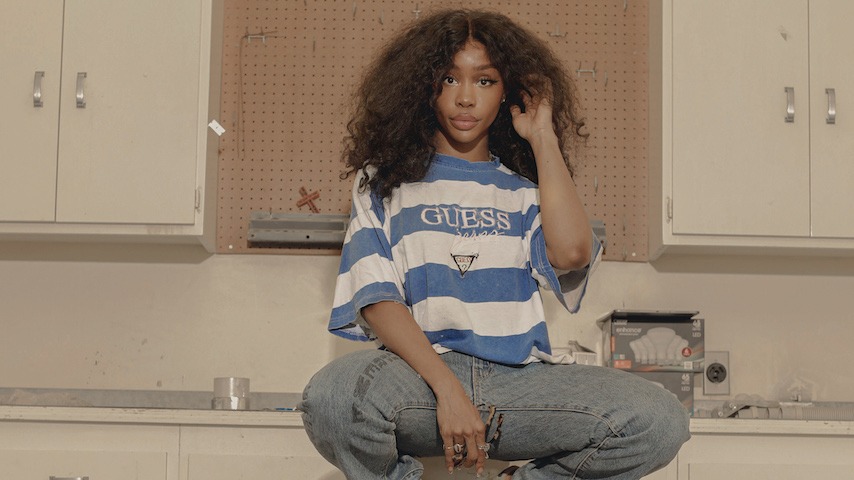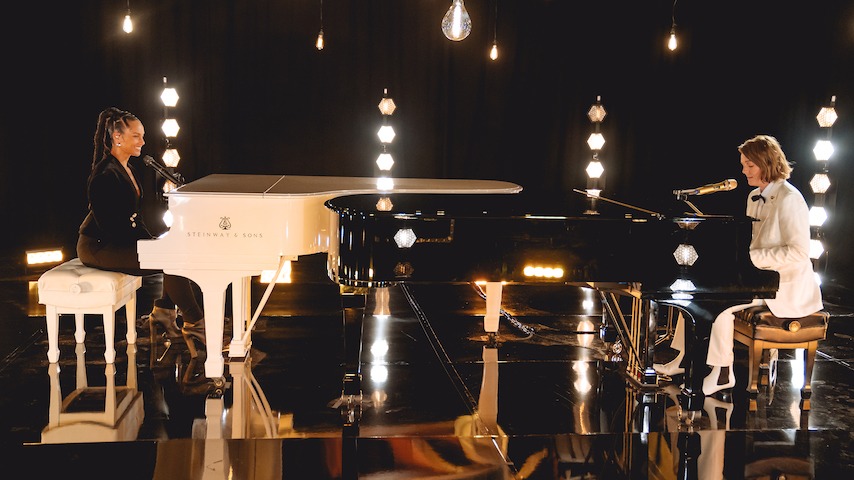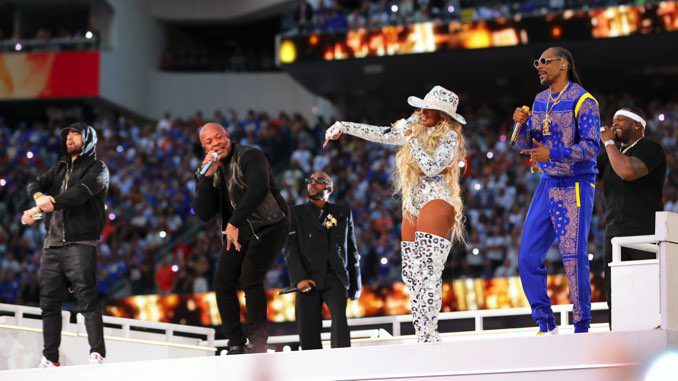When songwriters come up with new material, we’re used to experiencing the songs twice: first as studio recordings (audio and/or video) and then as live performances. But in addition to everything else, the pandemic disrupted this pattern and often left us hanging, waiting for the second shoe to drop.
So it was that Julien Baker could release one of the year’s best albums, Little Oblivions, in February and not do a proper tour for more than six months. That tour finally begins this weekend, September 3-5, with shows in Alabama and Georgia (though the Bonnaroo Festival, where she’d been set to perform Sunday, was canceled due to flooding this week). Baker did do a handful of pop-up shows in her current hometown of Nashville last spring, and she did appear at the Newport Folk Festival on July 28.
The latter set was revelatory, for it allowed the singer to present her songs in an unplugged format where every lyric subtlety and every melodic nuance could be clearly heard. And it allowed Baker, sitting in a plastic folding chair, her dark red hair parted in the middle and flowing over her gray T-shirt, to banter informally with the audience.
Woody Guthrie famously had a bumper sticker on his acoustic guitar that read, “This Machine Kills Fascists.” On hers, Baker had little white stickers that spelled out, “Queer Joy.” At Newport, she explained the motto as she introduced the song “Rejoice”: “I put ‘Queer Joy’ on both my instruments, because people kept saying my songs were sad. But I’m really joyful and happy about a future where queerness is just a part of life.”
She then played that song from her 2015 debut album, Sprained Ankle, with strong but patient chords, and a voice that started in the trembling whisper of a confided secret and climaxed in a bellowed declaration. The lyrics began with a bleak description of homeless teenagers sleeping on a bench or in a plastic bag near the train tracks, wondering what’s worse: the daze of addiction or the shakes of withdrawal. But as her vocal gained power, the song’s attitude shifted, and soon she was addressing a deity directly, arguing that her complaints are a kind of prayer, that knowing those prayers are heard is reason enough to “rejoice.”
Such an arrangement is a familiar tactic for Baker: She often moves back and forth between private thoughts and public testifying, between a depressing present and a better future, between despair and hope, between quiet music and loud.
“That’s a trope I recognize in my music,” she says over the phone from her home in East Nashville. “I start out small and then get big and then turn small again. Maybe I have to have moments of being introspective and withdrawn to justify a noisy song like ‘Hardline.’ That’s the kind of song I grew up with, but there’s a part of me that wants balance. I usually performed solo during the first two records, so I had limited instrumentation. But on the crescendo parts, sometimes people would sing with me, and that felt sort of like camaraderie.”
At Newport, Baker presented four songs by herself, then brought out Mariah Schneider, the other vocalist and guitarist on Little Oblivions, for five songs before finishing up by herself. Baker even played banjo on three tunes. “I’m a hobby banjo player,” she told the crowd. “I’m trying to reconnect to my Appalachian roots, so I thought I’d bring it to the Newport Folk Festival. But I forgot there’d be some really good banjo players here.”
It was the kind of self-deprecating humor that lightened the darkness of so many of the songs and restored the balance she’s been seeking. There was humor in the way she conflated drugs and religion on “Faith Healer,” another new song she sang at Newport. When she conversationally sang, “I miss the high, how it dulled the terror and the beauty,” it wasn’t clear if the intoxication came from whiskey or the Bible—or if it even mattered. After all, is the faith healer all that different from the snake oil dealer?
“The intention of ‘Faith Healer,’” she confirms, “was to write about intoxicants from the point of view of a sober person who’s started to use again and recognizing the similarities with religious experience. Substances are neurological and psychological, and religion can become a psychological impediment, which can become neurological. Both can be fun and provide you with a lot of comfort, but if they’re not used wisely they can quickly become destructive. I don’t know how to balance that, but I’m trying.”
The twin themes of drinking and religion form the thread that runs through Little Oblivions, and give the album its title. The record opens with churchy organ, followed by Baker’s admission that she “blacked out on a weekday—is there something I’m trying to avoid?” When the organ is replaced by brittle, indie-rock guitar, she sings louder: “I’ll split the difference between medicine and poison, take what I can get away with.”
She didn’t perform “Hardline” at Newport, but she did sing the album’s next and scariest song, “Heatwave,” which imagines what it would be like to put “Orion’s belt around my neck and kick the chair out.” The temptation to suicide is made all the more alluring by a spooky, electric-guitar figure on the record; onstage, it was normalized by the back-and-forth between Baker’s banjo and Schneider’s acoustic guitar.
They also skipped “Relative Fiction,” which continues the new album’s suicide theme with the couplet, “You could see me dangling, glow like a cherry.” And yet this song uses its loping rhythm and lazy, catchy guitar figure to reach some hope at the end. “I don’t need a savior,” she declares. “I need you to take me home.” Whether the savior is Jesus or a would-be, white-knight lover, the narrator has an epiphany: She can no longer live up to impossible standards of salvation and damnation. She’s “finished being good”; now she can just be OK.
“‘Relative Fiction’ is very bleak,” Baker admits, “but it’s very bouncy and uplifting musically. There’s a sadness when you discover your life’s not going to be what you thought it was going to be, but there’s something healthy about that. I don’t want to say that hope is foolish, but it can be naïve. I was reading this thing about how nihilism and romanticism can both paralyze you from action. Reasonable hope is believing that human beings are resilient and we’re capable of overcoming challenges.”
I ask her for an example of reasonable hope. “You can think,” she replies, “‘I’m not going to vote because it’s already decided.’ Or you can think, ‘I’m not going to vote because it’s all going to work out in the end.’ Both thoughts stop you from acting. Do I think there’s going to be a president who will eliminate poverty in a single four-year term? No, but voting, praying, recycling are all things I still do, even if people say they don’t matter. Because you have to practice hope to make it real.”
The path she takes from despair to hope in “Relative Fiction” is traveled by her savvy use of juxtapositions and dynamics in her arrangements. The drum loop is harsh and industrial, but the guitar parts are relaxed and friendly. When the loop disappears, she can sing quietly and intimately. When the loop returns with a swooshing synth in tow, she raises her voice to make sure she’s heard over “the drunks at the bar [who] talk over the band.”
“On this record,” she argues, “when a song reaches a musical climax, I feel like there’s some anger in it, like shouting out of desperation, allowing myself to get loud. That is how I try to write songs, with an audience in mind, to insinuate some positive moral to the suffering described in the song. On this record, it felt better to just document the suffering without feeling beholden to the audience to turn it into an anthem of recovery. The blessing and the curse at the same time sounds trite, but it allowed me to step back from the audience and just speak for myself.”
But at the core of Little Oblivions is her inventive use of words, which describe not only the walls closing in on her, but also create the door to get out. It’s as if she wrote her way out of a very dark place. As she sings in “Relative Fiction,” “I try to express / I can’t understand / I beat at the keys / I bloody my hands / till you hear me.” She had felt lost when exhaustion and then the pandemic pulled her off the treadmill of touring, but writing about it helped.
“I was doing 250 shows a year for four years,” Baker explains, “and I didn’t know who I was when the wheels slowed down. I’m a musician who writes songs, and suddenly it became my profession. My friends and the people I work with encouraged me to take some time off and take care of myself. I didn’t know how to take care of myself. I was in an unstable place; I wasn’t healthy enough to continue to keep touring.
“I thought I wasn’t sure I’d want to keep touring and maybe I’d need a degree for another job. So I went back to school I was being asked in interviews at age 20 to talk about queerness and God, two enormous topics. It was nice to just learn and inform myself. Being a student and not a performer helped me reconnect to why I became a performer in the first place. When it wasn’t my job and I was just writing songs, I was making songs because it was fun; it made my soul feel good. It was a safe place to put my feelings.”
Once she decided to unblinkingly examine her fall from sobriety and her doubts about religion and her career, she began to find strength in metaphors and the economical phrases that have always been her trademark. On “Cry Wolf,” she condenses a whole season of inebriation as one particularly disastrous New Year’s Eve party. On the first morning of January, she awakes feeling as if someone has shoved a charcoal briquet down her throat, as if everything she was sure of has floated out the window like last night’s cigarette smoke.
On “Highlight Reel,” she describes herself as “passed out in the back of the cab,” unsure if the cab has driven off a bridge into the river or if it just seems that way. On “Favor,” the narrator’s sitting on the hood of a care, drunk and bored in a parking lot, when her friend saves a moth caught in the grill of a truck. The narrator asks why it’s easier to be tender “with anything less than human.” The sentences are elliptical; the rhymes are more suggestive than perfect; the scraps of dialogue and description dare the listener to fill in the gaps.
“I’ve always liked words,” Baker confesses. “I never enjoyed math and science. I like writing and reading, learning how to use language in a way that’s beautiful. Poetry allows you to step outside the boundaries of academic language or everyday language. That was always attractive to me. Doing close readings of poems in college made me a more intentional songwriter and listener. I consider listening to music all the time as part of my job. I always ask questions: ‘Why did they use this language? Why did they use this chord?’”
One of the best songs on the new album is named after its anchoring chord: “Song in E.” In the studio, it was a piano ballad with a classic Tin Pan Alley melody to match, even as the lyrics describe the bottommost depths of her depression. At Newport, she sang it with just her acoustic guitar, but the tune was just as captivating and her claim that she’s not fishing for pity just as insistent. Maybe she’s addressing a girlfriend; maybe she’s addressing a Supreme Being, but her message is the same: “Give me no sympathy / It’s the mercy I can’t take.”
“On this new record,” Baker says, “there’s a lot of self-indictment. When I’m singing that way, it could sound like I’m seeking approbation, but I’m not. It’s more exhausting to try to deceive myself or to manipulate others into thinking what’s not true than to admit I have flaws. This is true in my personal relationships too.
“Sometimes I listen to my older songs, and I say, ‘Listen to you, 18-year-old Julien, poor you. You have problems with your parents or someone you like doesn’t like you, like you’re the first one that ever happened to.’ I laugh sometimes, because that makes it bearable.”
Watch Baker’s 2016 Paste Studio session below.




